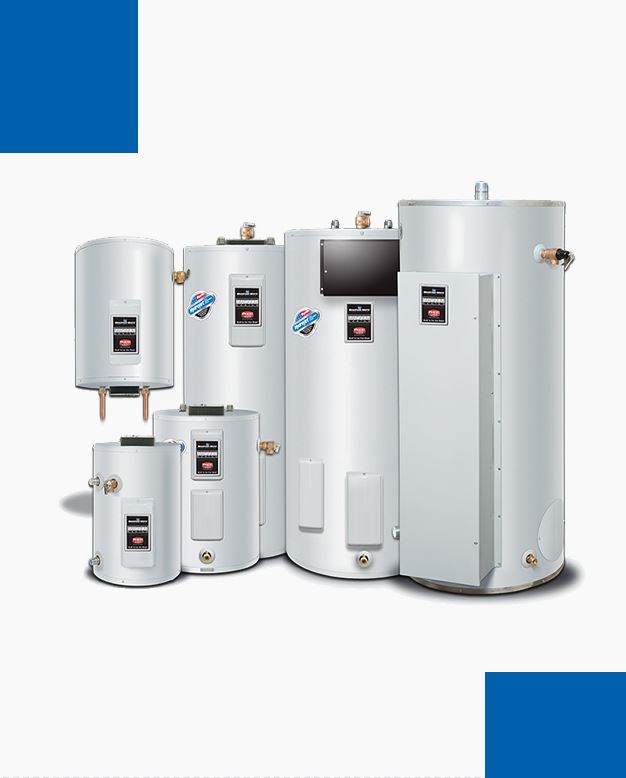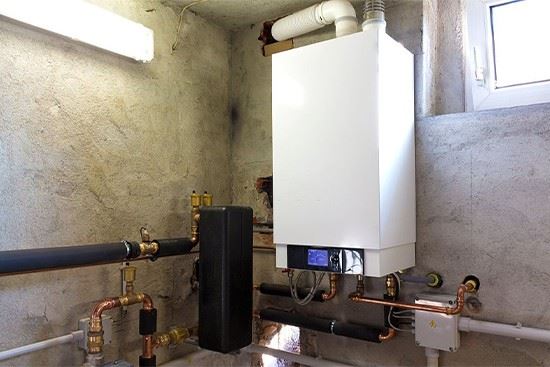When selecting a water heater, it's important to consider factors such as energy efficiency, size, and budget, type and to research different brands and models to find the one that best meets your needs in Montgomery County PA & Main Line PA.
Top brands known for their quality and reliability include:
To find the right water heater for your home in Montgomery County PA & Main Line PA, it’s important to consider energy efficiency, size, budget, and research different brands and models. Energy efficiency helps reduce bills and carbon footprint, while size should meet your household’s hot water Heating needs. Cost and quality should be balanced, and research will help you choose a reliable, durable, and suitable water heater. Taking the time to consider these factors will help you find a cost-effective and energy-efficient water heater that provides hot water as needed.
Top brands known for their quality and reliability include:
Rheem:
Rheem is a well-regarded and influential brand in the water heater industry. Recognized for its extensive product range, Rheem provides a variety of water heaters, including tankless and hybrid models designed for both residential and commercial use. Emphasizing innovation and excellence, Rheem has positioned itself as a preferred option for individuals in search of dependable and effective water heating solutions.Bradford White:
Bradford White has carved a niche for itself as a manufacturer of robust and enduring water heaters. Boasting a range of both gas and electric models, Bradford White is celebrated for the durability and long-lasting performance of its products. With a focus on delivering reliable and efficient heating solutions, Bradford White has earned a solid reputation in the industry, appealing to those who prioritize longevity and dependability in their water heaters.AO Smith:
Another stalwart in the water heater market, AO Smith is a trusted brand offering a diverse selection of gas and electric water heaters. Catering to both residential and commercial needs, AO Smith has gained popularity for its commitment to providing high-quality and reliable water heating solutions. Whether gas or electric, AO Smith products are designed to meet the diverse demands of consumers seeking efficient and long-lasting performance from their water heaters.
Navien Tankless:
Navien has become synonymous with innovation and energy efficiency in the realm of tankless water heaters. Specializing in on-demand hot water systems, Navien’s tankless heaters are acclaimed for their space-saving design and eco-friendly operation. These units provide users with the convenience of hot water whenever needed while minimizing energy consumption, making Navien a favored choice for those looking to combine efficiency with modern technology.Rinnai:
Rinnai is a well-respected brand known for its comprehensive range of tankless water heaters. Acknowledged for delivering hot water on demand, Rinnai’s tankless heaters are designed with a focus on energy conservation. The brand has earned a reputation for providing reliable and efficient water heating solutions, making it a preferred choice for consumers who prioritize both performance and sustainability in their home appliances.State:
Catering to a wide spectrum of needs, State is a brand that offers both tank and tankless water heaters. With models tailored for both residential and commercial use, State provides versatile solutions to meet various requirements. The brand’s commitment to quality and efficiency has made it a trusted name in the water heater industry, appealing to consumers seeking reliable and customizable water heating options for their homes or businesses.Types of Hot Water Units known for their requirements include
A tankless water heater, which is also called an on-demand water heater, heats water only when it is required instead of storing it in a tank. This type of water heater can provide hot water instantly and is usually more energy-efficient than traditional tank-style water heaters. The tankless system works by heating water in a heat exchanger as it flows through the unit when the hot water tap is turned on. Although they take up less space and can provide an unlimited supply of hot water, tankless water heaters can be more expensive to install than traditional water heaters and may require gas line or electrical system upgrades. It is important to weigh the initial costs and long-term energy savings before deciding if a tankless water heater is suitable for your home.
An on-demand water heater, also known as a tankless water heater, is a type of water heating system that heats water as it is needed, rather than storing hot water in a tank. When hot water is needed, cold water flows through the unit and is heated by a gas burner or electric heating element. The hot water then flows out of the unit and to the faucet or appliance. Unlike traditional water heaters that store and continuously heat a large amount of water, tankless water heaters are designed to provide hot water on demand, which can make them more energy-efficient and space-saving. However, they may require upgrades to gas lines or electrical systems, and can be more expensive to install than traditional water heaters.
A point-of-use water heater is a small, electric or gas-powered appliance that is installed directly at the point of use, typically under a sink or in a bathroom, to provide hot water to that specific location. Unlike traditional tank-style water heaters, which store and heat a large amount of water and distribute it throughout the house, point-of-use water heaters are designed to provide hot water only where it’s needed, thereby reducing energy waste and improving energy efficiency.
Point-of-use water heaters are available in various sizes and capacities, ranging from as small as 2.5 gallons to as large as 20 gallons. They can be powered by electricity or gas, and they are typically more energy-efficient than traditional tank-style water heaters, as they only heat the amount of water needed at any given time.
An under-sink water heater is a type of point-of-use water heater that is installed beneath a sink or nearby cabinet to provide hot water to that specific location. These compact water heaters are designed to provide hot water quickly and efficiently, without the need to run water through long pipes. They can be powered by electricity or gas and are often used in situations where it is impractical or inefficient to run hot water from a central water heater to a particular location, such as in a bathroom or kitchen. Under-sink water heaters can help save energy by heating water only when it is needed and can reduce the amount of water wasted while waiting for hot water to arrive at a particular location. However, they may not be suitable for high-demand situations, as they are designed to provide hot water to a single location or appliance.
A power vent water heater is a type of water heater that uses a fan or blower to exhaust the combustion gases produced by the burner out of the home through a vent. The fan or blower creates positive pressure, which allows the water heater to be vented through a sidewall or roof rather than through a chimney or flue. This makes power vent water heaters a popular choice for homes that lack a chimney or have a chimney that is not suitable for venting a water heater. Power vent water heaters can be powered by electricity or gas, and they are typically more energy-efficient than traditional water heaters because they use combustion gases to heat the water more efficiently. However, they may be more expensive to install and maintain than traditional water heaters, and they may require a dedicated electrical circuit to operate the fan or blower.
A heating system that stores and heats a large amount of water in a tank until it is needed. The tank is typically made of steel or lined with glass and is insulated to minimize heat loss. A burner or heating element at the bottom of the tank heats the water to the desired temperature, and a thermostat controls the temperature and cycles the burner or element on and off as needed to maintain the set temperature. When hot water is used in the home, cold water enters the tank through a dip tube and is heated to replace the hot water that was used. Traditional tank water heaters come in a range of sizes to accommodate different household needs and typically have a lifespan of around 10-15 years. However, they may be less energy-efficient than other types of water heaters due to standby heat loss and may require more frequent maintenance to ensure optimal performance.
Types of Hot Water heaters for Residence and Commercial
Electric water heaters use electricity to heat water and are often more affordable upfront but may be less energy-efficient.
Natural gas water heaters use gas burners to heat water and can be more energy-efficient than electric heaters but may require a gas line installation.
Propane water heaters are similar to natural gas heaters but use propane fuel instead and can be a good option for remote locations without access to natural gas.
Heat pump water heaters use electricity to move heat from the air or ground to heat water and can be very energy-efficient but may be more expensive upfront.


